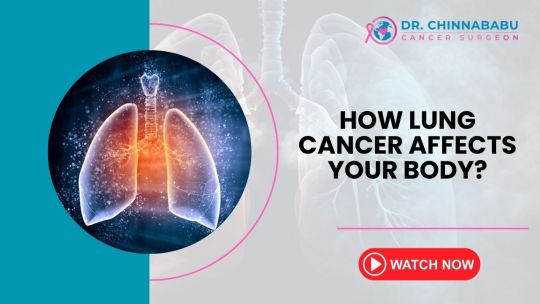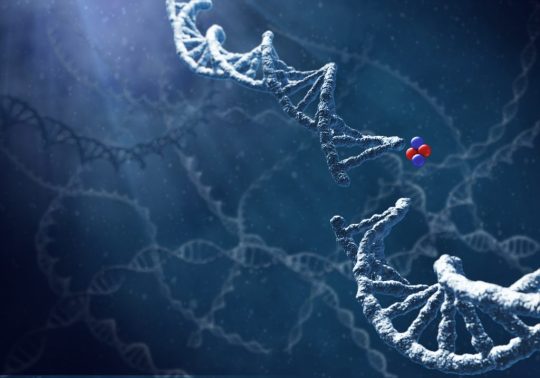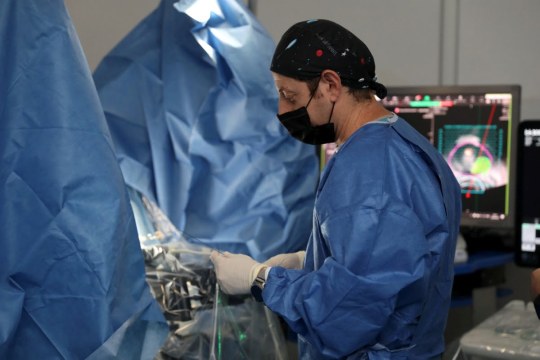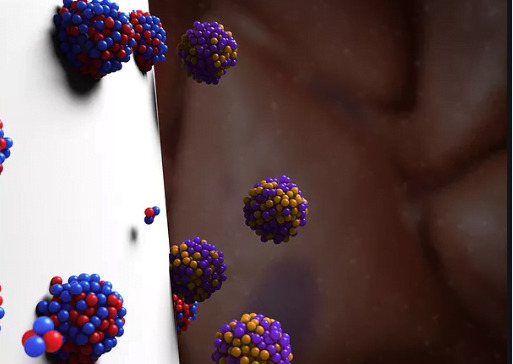#Targeted therapy for lung cancer
Explore tagged Tumblr posts
Text
How Lung Cancer Affects Your Body?

Dr. Chinnababu Sunkavalli, a robotic surgical oncologist, explains how lung cancer affects your body. Symptoms include a persistent cough, trouble breathing, chest pain, and fatigue. The cancer can also spread, causing more severe health issues. To Know more about Dr. Chinnababu Sunkavalli, follow his YouTube channel.
youtube
#Lung cancer symptoms#Lung cancer treatment#Lung cancer diagnosis#Non-small cell lung cancer#Small cell lung cancer#Immunotherapy for lung cancer#Targeted therapy for lung cancer#Lung cancer awareness#Lung cancer research#Lung cancer survivor#Youtube
0 notes
Text
youtube
#NSCLC#HER2#KRAS#MET#copy-number gains#oncogene overlap#tissue-based NGS#mutational landscape#genomic profiling#precision oncology#survival impact#lung cancer research#targeted therapies#cancer genomics#molecular oncology#personalized medicine#cancer heterogeneity#next-generation sequencing#tumor behavior#therapeutic strategies.#Youtube
0 notes
Text
Lung Cancer Unveiled: Everything You Need to Know About Causes, Symptoms, and Treatment Options
Lung cancer
Overview
Lung cancer is a type of disease that begins in the lungs and is one of the leading causes of cancer deaths worldwide. The lungs are two vital organs in your chest that take in oxygen and release carbon dioxide. Cell lysis in the lungs is an important source of spread of malignant growth worldwide.
Risk factor
The most important risk factor for lung cancer is smoking, but non-smokers can also develop the disease. The time and amount of cigarettes smoked can affect the likelihood of a lung cell analysis. Why and for what Smoking is the most common cause of lung cancer, but exposure to secondhand smoke can also increase the risk of this disease.
Some lung cancers have an unknown cause, making early detection and prevention difficult.
Types of lung cancer
There are two main types of lung cancer: small cell lung cancer and non-small cell lung cancer. Small cell lung cancer is mostly associated with smokers, while non-small cell lung cancer includes several different types of lung cancer, including adenocarcinoma, squamous cell carcinoma, and squamous cell carcinoma. Lung cancer can cause various complications such as shortness of breath, coughing up blood and pain. If cancer spreads to the central airways, shortness of breath may occur, while coughing up blood may be caused by bleeding from the disease. Pain may also occur if cancer has spread to other parts of the body, such as the bones. Fortunately, there are several treatments available to treat these complications, so it's important to discuss all symptoms with your doctor. Caring Surgery: Surgery is the main treatment option for early stage lung cancer. During the operation, the cancerous tissue is removed along with the surrounding healthy tissue. Radiation therapy: Radiation therapy uses high-energy radiation to destroy cancer cells. It can be used alone or in combination with other treatments. Chemotherapy: Chemotherapy uses drugs to kill cancer cells. It can be given orally or intravenously and is often used in combination with other treatments. Targeted therapy: Targeted therapy uses drugs that target specific genes or proteins in cancer cells to stop their growth. Immunotherapy: Immunotherapy is a newer form of treatment that increases the immune system's ability to recognize and destroy cancer cells. Palliative care: Palliative care focuses on treating symptoms and improving quality of life in patients with advanced lung cancer.
conclusion
lung cancer is a serious disease that affects the lungs and can have many harmful effects on the body. Although smoking is the most common cause of this disease, non-smokers can also develop it. It is very important to be aware of the symptoms of lung cancer and see a doctor immediately if they appear. In addition, early detection and prevention through regular health checks and smoking cessation can help reduce the risk of developing this disease.
For more information visit www.oncorelief.in
#lung cancer#causes#treatment options#smoking#radiation therapy#chemotherapy#surgery#targeted therapy#immunotherapy#palliative care#early detection#symptoms
0 notes
Link
Dr. Ajay Sharma is top medical oncologist in north delhi and providing targeted therapy for cancer in delhi i.e. breast cancer, lung cancer, ovarian cancer, leukaemia etc; meet targeted therapy specialists in delhi for targeted therapy for pancreatic cancer in delhi.
#targeted therapy for breast cancer in delhi#targeted therapy for lung cancer in delhi#targeted therapy for ovarian cancer in delhi#targeted therapy for leukaemia in delhi#targeted therapy for pancreatic cancer in delhi#targeted therapy for cancer in delhi#targeted therapy for cervical cancer in delhi#targeted therapy gynecologic cancer in delhi#targeted therapy for gastrointestinal tumors in delhi#top medical oncologist in north delhi#targeted therapy specialist doctor in delhi#targeted therapy specialists in delhi
0 notes
Text
Your psychiatrist and surgeon do not care for you.
They want to make money off of you.
They are willing to get you exogenous hormones that can give you higher rates of depression, cancer, cysts on your clitoris, PCOS, liver, kidney, and heart disease, blood clots in the lungs, strokes, polycythemia and hyperlipidemia, thrombosis, brain tumors, acute coronary syndrome, malignant hypertension, anemia, a worsening of psychosis, hepatitis, and to briefly mention dizziness, nausea, and chronic headaches. This is from hormones alone. They do not tell you this because your doctors make money off of you and don’t want to dissuade you from giving them hundreds of dollars.
Long term studies admit that they lose a large portion of their participants, but they assume that those participants are happy.
What is becoming more likely to me is that these participants died. And their deaths will never be considered or remembered. How can we be sure that transitioning is good long term if we have no record to even begin to consider that being true?
Gender Affirming Care is not regulated or approved for being a good solution to gender dysphoria.
When was the last time we thought that removing parts of the body was a good solution to helping mental problems? Oh yeah, with lobotomies.
There is no proof of “gendered brains.” The amount of white matter between women and men is so slight that it’s as defunct as race science. They overlap so heavily with little evidence of proper structural distinctions that it is dishonest to pretend there is any major pattern. There is no proof that even these “differences” observed in trans women vs. cis men are because of gender dysphoria, or are the effects of hormones. We have no understanding of how gender dysphoria manifests or how it works.
You are being experimented on.
If hormones can worsen your mental health because they are exogenous, how are you being treated? Even if gender affirming care lessened gender dysphoria, it is being exchanged with depression and possible psychosis. You are exchanging one bad thing for another. This will not help you long term.
Gender Dysphoria will still manifest through your memories, your knowledge of chromosomes, and the fact that you have a secret
It cannot go away as long as you are aware of your own transition. It is not helping you. You have to continue to delude yourself that it is working for it to work. That is the definition of a placebo.
Why was the first drafted solution to gender dysphoria hormones and surgery and not therapy?
Why? Nobody has given me an answer to this. We have never even tried to see if any antidepressants or therapies work to help gender dysphoria in a way that won’t make you targeted, bullied, and fearful for our lives. That is fucking cruel.
Listen to detransitioners, listen to the trans people who suffered as a result of surgery.
It may not be rare. Recent studies have shown that every trans person that was put on hormones had a negative effect to their health. EVERY. Why is the assumption that we must suffer to be happy? Why can’t we be nonconforming without giving up the rest of our lives to be on hormones and having surgery after surgery? Why? Genuinely, why?
There are trans women who had colon vaginoplasty, where they use part of the colon to create a vagina. These women start to shit through their vaginas. And these surgeries often follow a previously failed SRS procedure. It is a last ditch effort and it is horrific to your body.
While having complications, many detransitioners and trans people were ghosted by their doctors.
They don’t give a fuck about you. They want to make money off of you. As trans people and detransitioners were suffering after their surgeries, their doctors abandoned them because well…they didn’t have to do anything to help them. Because gender affirming care is not approved or regulated. There is no proof that it even helps beyond a few surveys that may not have honest answers and exclude detransitioners and those who killed themselves as a result of their failed surgeries.
I transitioned, and now I may be suffering dire consequences of it, because I bought into this idea that experimenting on my own body would be worth it. But now I feel the same as I did before I detransitioned and after. Nothing has fundamentally changed. I was still dysphoric but I was making myself deeply unwell to satisfy society’s perception of what a woman should be.
You can grow your hair out, you can wear makeup, you can be feminine. You can cut your hair short, you can ditch makeup, and you can be masculine. You don’t have to hurt yourself to fit into this standard when it is logically possible for you to accept how you were born.
It cannot be impossible for you to be happy.
These greedy doctors are preying on vulnerable people to make money.
#transandrophobia#anti transmasculinity#transmisandry#liberal feminism#radical feminism#trans discourse#transition#detrans#detransition#transgender#transmisogyny#transmedicalism
32 notes
·
View notes
Text

One of the hardest choices I make as a physician treating cancer patients is advising the patient and the family of terminal stage patients who experience decline in lung function. On one hand, placing then on a ventilator may be futile with a decline in quality of life for stage IV patients. Intubating the patient may buy some more time to speak and to even say goodbye to love ones.
A patient of mine gave these giant mangoes from his farm. He has stage IV lung ca. He has been doing well on his targeted therapy until last month when his scans showed disease progression.
He was admitted and crashed at an accelerated pace. Time came when his oxygen dipped to the 50s and we needed to act quickly.
“Let’s give it a try” I said on the phone. I was honest enough to tell them we might not be able to remove the machine but maybe the last chance they will be able to talk to him at least for a finite amount of time.
We saw each other this morning and the wife was happy to talk to her husband again. I do not have the answers until when. I am praying and hoping we are able to pull him off the ventilator.
For now, let’s be thankful for these moments we feel faint, weak and hopeful.
13 notes
·
View notes
Text
A novel radiation treatment for cancer with a 100-percent success rate in its pilot trial is now in Phase 3 pivotal trials ahead of receiving Food and Drug Administration (FDA) approval.
Jerusalem-based startup Alpha TAU is expanding its trials of the treatment for skin and other cancer, after its first trial of 10 patients succeeded beyond the company’s expectations.

“Those patients got 100 percent CR [complete response],” Sofer says.
The pilot trial, conducted at multiple locations in the US last year, examined whether Alpha TAU’s DaRT (Diffusing Alpha-emitters Radiation Therapy) technology could successfully deliver targeted radiation therapy to patients with malignant skin and superficial soft tissue tumors that had returned or could not be removed surgically.
Alpha TAU had hoped that the treatment would be successful in at least seven of the 10 trial participants, but instead registered successful delivery to all 10. CT scans showed a 100 percent complete response rate at 12 weeks after the treatment and again at 24 weeks, with no evidence of the disease recurring in any of the subjects.

The results showed only mild or moderate side effects related to the device, and no systemic toxicity from it.
Radiation therapy for cancer normally uses beta and gamma particles. Alpha particles, while proving deadly for cancer cells in a tumor, are not traditionally used as they cannot travel far in solid masses.
Alpha DaRT, however, delivers the alpha particles directly into the tumor via a narrow device, inserted under local anesthetic, for a period of two to three weeks. The device is then removed and the patient monitored.

The findings of the pilot trial were published this month in the Journal of the American Medical Association (JAMA), months after submitting the results to the FDA.
The treatment is now undergoing its pivotal trial – the final one before the American agency gives it approval.
“We submitted the results that you see now to the FDA, and the FDA told us that we can submit the protocol for the last phase, the pivotal,” says Sofer.

A pivotal trial is required by the US and European Union drug agencies in order to receive approval to market a new form of medication; studies can involve thousands of subjects and test the efficacy and impact of a drug.
Sofer says that the successful findings of the trial has led to medical institutes around the world clamoring to work with Alpha TAU, but for now research is limited to just a handful of locations for the pivotal trial.
“Many, many, many centers all around the world want to participate,” he says. “We are working with 20 centers in the US, two or three centers in Canada and another four in Israel that are going to participate in this trial.”
youtube
Sofer says Alpha TAU will be ready to submit the findings of the pivotal trial in around a year and a half from now.
“We will have six months of follow up, then we will analyze the results and send it to the FDA,” he says of the current trial. “The submission to the FDA can be in about 18 months from now.”
The revolutionary treatment is also being tried on other cancers, according to Sofer, who clarifies that, “right now it’s only for solid tumors.”
“We’re working on pancreas and lung and breast [cancer],” he says, explaining that the company is currently at various stages of testing for these other forms of malignant tumors.

The device itself is easy to use and does not require specialized and often costly equipment in order to treat patients.
“When it is approved, it will be for any hospital, medical cancer center, all over the world,” Sofer explains.
“You don’t need any special equipment, and you don’t need the shielding,” he says, referring to the protective gear used in other forms of radiation therapy but are not needed for alpha particles.
“It will be very simple to implement. You don’t need special equipment or investment in capital expenditure or something like that, [just] regular tools.”
70 notes
·
View notes
Text
9-1-1 Lone Star Owen Strand (Rob Lowe) Whump

1x01 Pilot - Discovery of lung cancer, in shock, saves son from overdose 1x03 Texas Proud - Chemotherapy, feeling the side effects, weak, drunk, throws up, angry outburst 1x04 Act of God - Chemotherapy, feeling the side effects, pale, throws up, confronted about hidden cancer diagnosis, comforted 1x05 Studs - Chemotherapy side effects (its not puking <_<) 1x06 Friends Like These - Threatened by "nemesis," reveals cancer diagnosis, threatened with retirement/betrayed 1x07 Bum Steer - Collapses/passes out, sweating, exhausted 1x08 Monster Inside - Emotional 2x01 Back In The Saddle - Emotional talk, risks life 2x02 2100 - Bottling emotions, watches friend die, in shock 2x03 Hold The Line - Helicopter crash, trapped in abandoned mine, passes out from lack of oxygen, collapse, carried, IV 2x05 Difficult Conversations - Emotional (but this man does not cry), falling in love again 2x06 Everyone and Their Brother - Life in jeopardy saving someone in a minefield 2x07 Displaced - Emotional damage 2x08 Bad Call - Son kidnapped, emotional damage/breakup 2x10 A Little Help From My Friends - Drunk, severely depressed, relatable talk with lonely child, depression intervention, dog health scare 2x11 Slow Burn - Recovery, tight lungs/coughing, "unmoored" (bro wtf), knocked unconscious 2x12 The Big Heat - Wrongfully imprisoned, unnerved from talking to a psychopath, bandaged/blistered arm 2x13 One Day - Stapled, gunpoint 2x14 Dust to Dust - Caught in dust-storm, almost falls down elevator shaft, betrayed 3x02 Thin Ice - Falls, unconscious, bleeding, headache, taken hostage 3x03 Shock & Thaw - Taken hostage by cartel, hurts his head, tense standoff, taken hostage again, dangerous fight 3x04 Push - Emotional 3x05 Child Care - Emotional Pain 3x07 Red vs Blue - Patience tested (failed), gets in a fight, bruised face, bandaged wrist 3x08 In The Unlikely Event of an Emergency - Plane engine blows up 3x09 The Bird - Scratched by bird, reveals depression/PTSD after 9/11, emotional, guilt, emotional talk with The Bird (;-;) 3x11 Prince Albert in a Can - Hurt hand punch, emotional moments with girlfriend, life targeted 3x12 Negative Space - Life targeted, two scary encounters 3x13 Riddle of the Sphynx - Strange argument with girlfriend (anger management issues) 3x14 Impulse Control - Talks about anger management therapy 3x15 Down to Clown - Anger management therapy, clown induced panic attack 3x16 Shift-Less - Facing trauma, emotional pain 3x17 Spring Cleaning - Punched 3x18 A Bright and Cloudless Morning - 9/11 PTSD, cancer resurgence, caught in building explosion, trapped under rubble, serious head injury, bleeding, hallucinating, emotional, hospitalized, rescued, weak 4x01 The New Hotness - Coping with loneliness 4x02 The New Hot Mess - Tense, risking his life 4x03 Cry Wolf - Mysterious black eye, paranoia 4x04 Abandoned - In danger, threatened by the Honor Dogs 4x05 Human Resources - Life targeted 4x06 This is Not a Drill - Upset, paranoid, facing the Honor Dogs, in danger, knocked down from explosion, risking his life with a bomb, jumps out of moving vehicle, exposed to laughing gas
#whump#whumplist#whump list#emotional whump#owen strand#owen strand whump#rob lowe#9 1 1 lone star#9 1 1 lone star whump#rob lowe whump
48 notes
·
View notes
Text
Cancer in Men: Common Types, Symptoms, and Treatment Considerations

Cancer is a disease that occurs when abnormal cells grow and spread uncontrollably in the body. It can affect any organ or tissue, and it can cause various symptoms depending on the location and stage of the cancer. Cancer is among the leading causes of death in men worldwide, and some types of cancer are more common or more deadly in men than in women.
Some of the most common types of cancer in men are:
Prostate cancer: This is the most common cancer in men, affecting the prostate gland that produces semen. It usually grows slowly and may not cause any symptoms until it is advanced. Some possible signs include difficulty urinating, blood in urine or semen, erectile dysfunction, or pain in the lower back or pelvis.
Lung cancer: This is the leading cause of cancer death in men, often due to smoking or exposure to other lung irritants. It can affect one or both lungs and may cause symptoms such as coughing, chest pain, shortness of breath, wheezing, or coughing up blood.
Colorectal cancer: This is the third most common cancer in men, affecting the colon or rectum. It can cause symptoms such as changes in bowel habits, blood in stool, abdominal pain or cramps, weight loss, or fatigue.
Skin cancer: This is the most preventable type of cancer, usually caused by exposure to ultraviolet (UV) radiation from the sun or tanning beds. It can affect any part of the skin and may appear as a new or changing mole, a sore that does not heal, a red or scaly patch, or a growth that bleeds or itches.
Head and Neck cancers: This is the most common cancer in men in India. The biggest risk factor is chewing tobacco, drinking too much alcohol and HPV infections. Tobacco use is the most common cause of head and neck cancers.
Other types of cancer that are common or serious in men include bladder cancer, kidney cancer, liver cancer, pancreatic cancer, testicular cancer, and leukaemia.
The treatment options for cancer depend on the type, stage, location, and overall health of the patient. Some of the common treatments include surgery, radiation therapy, chemotherapy, immunotherapy, targeted therapy, hormone therapy, and palliative care. The goal of treatment is to remove or destroy the cancer cells and prevent them from spreading or recurring.
The best way to prevent or detect cancer early is to adopt a healthy lifestyle and get regular screenings and check-ups. Some of the preventive measures include:
Avoiding tobacco use
Limiting alcohol consumption
Eating a balanced diet rich in fruits and vegetables
Maintaining a healthy weight
Being physically active
Protecting yourself from the sun
Getting vaccinated against certain viruses that can cause cancer
Getting screened for prostate cancer, lung cancer, colorectal cancer, and skin cancer according to your age and risk factors
Cancer can be a scary and challenging diagnosis for anyone. However, with proper care and support, many men can survive and thrive after cancer. If you have any concerns or questions about cancer, talk to your doctor or a trusted healthcare professional. They can help you understand your risk factors, symptoms, diagnosis, treatment options, and coping strategies. Remember that you are not alone in this journey, and that there are many resources and support groups available to help you and your loved ones. Cancer can be a tough opponent, but you can fight back with courage and hope.
For more details click on the link 👇🏻 https://bit.ly/3osreVo
#ICANWIN#YESITSRAM#FightAgainstCancer#CancerAwarenessMatters#TogetherAgainstCancer#CancerWarriorsUnite#EmpoweredByHope#RaisingCancerAwareness#IgniteTheFight#ConquerCancerTogether#InspireHopeForSurvivors#CancerFreeFuture
48 notes
·
View notes
Text
The Detrimental Health Effects of Smoking: A Comprehensive Overview
Smoking remains one of the most pressing public health issues globally. Despite widespread awareness campaigns, millions continue to smoke, often underestimating the severe health consequences. This article delves into the various smoking health issues, highlighting the extensive damage smoking inflicts on the body and emphasizing the importance of quitting.
The Respiratory System: A Primary Target
One of the most immediate and severe smoking health issues is its impact on the respiratory system. Smoking damages the airways and the alveoli, leading to chronic respiratory conditions such as:
Chronic Obstructive Pulmonary Disease (COPD): This progressive disease makes it increasingly difficult to breathe, significantly reducing the quality of life.
Chronic Bronchitis: Characterized by a persistent cough and mucus production, chronic bronchitis results from inflamed bronchial tubes.
Emphysema: This condition involves the destruction of the air sacs in the lungs, leading to severe shortness of breath.
Cardiovascular Complications
Smoking is a major contributor to cardiovascular diseases, which are among the leading causes of death worldwide. Key smoking health issues related to the cardiovascular system include:
Heart Disease: Smoking damages the lining of the arteries, leading to atherosclerosis—a condition where arteries harden and narrow. This can result in heart attacks and strokes.
High Blood Pressure: The chemicals in tobacco smoke can elevate blood pressure, increasing the risk of heart disease.
Peripheral Artery Disease (PAD): Smoking causes the narrowing of blood vessels outside the heart, particularly in the legs, leading to pain and mobility issues.
Cancer: A Grim Reality
The link between smoking and cancer is well-established. Smoking is a leading cause of various cancers, including:
Lung Cancer: The most well-known smoking health issue, lung cancer, is predominantly caused by smoking. It remains one of the deadliest cancers worldwide.
Mouth, Throat, and Esophagus Cancer: Smoking affects nearly every part of the respiratory and digestive tracts, significantly increasing the risk of cancers in these areas.
Bladder Cancer: Harmful chemicals from tobacco are filtered by the kidneys and stored in the bladder, where they can cause cancer.
Impact on Reproductive Health
Smoking health issues extend to reproductive health, affecting both men and women:
Fertility Problems: Smoking can reduce fertility in both genders. In women, it can damage the ovaries and reduce egg production. In men, smoking can affect sperm quality.
Pregnancy Complications: Pregnant women who smoke are at a higher risk of miscarriage, premature birth, and having babies with low birth weight. Smoking also increases the risk of sudden infant death syndrome (SIDS).
Other Health Issues
Smoking is linked to a host of other health problems, including:
Type 2 Diabetes: Smokers are more likely to develop type 2 diabetes, and the condition is harder to control in smokers.
Weakened Immune System: Smoking weakens the immune system, making it harder to fight off infections.
Poor Oral Health: Smoking causes bad breath, gum disease, and tooth loss. It can also affect the sense of taste and smell.
Conclusion: The Urgent Need to Quit
The myriad smoking health issues underscore the urgent need for smokers to quit. Quitting smoking can dramatically improve overall health and reduce the risk of developing many severe diseases. While quitting can be challenging, numerous resources are available to support those who want to stop. Nicotine replacement therapies, prescription medications, counseling, and support groups can all play a role in helping individuals quit smoking for good.
In conclusion, the detrimental health effects of smoking cannot be overstated. By understanding the extensive damage smoking causes and taking steps to quit, individuals can significantly improve their health and quality of life.
2 notes
·
View notes
Text
Throat Cancer – Causes, Symptoms, Types and Treatment

What is Throat Cancer?
Throat cancer states the development of malignant tumors in the tissues of the throat, which includes the pharynx, larynx, and tonsils. It can affect various parts of the throat.
Types of throat cancer:
Pharyngeal cancer (Tonsillar cancer)
Laryngeal cancer
This type of throat cancer is categorized based on the specific cells involved and their characteristics, like squamous cell carcinoma, adenocarcinoma, or lymphoma. Squamous cell carcinoma is the most regular type, accounting for the majority of throat cancers.
Causes of throat cancer:
Use of tobacco
Consumption of alcohol
Human papillomavirus infection (HPV)
Poor diet
Age factor
Exposed to unidentified chemicals
Poor oral hygiene
Signs and Symptoms of throat cancer:
Continuous sore throat
Difficulty swallowing aka dysphagia
Change in voice
Ear ache
Non-stop cough
Undefined weight loss
Neck Swelling
Visible lumps or masses
Diagnosis of throat cancer:
Physical examination
Endoscopy
Imaging tests like CT scan, MRI scan, PET scan
Biopsy
Blood Test
Lung Function Test (LFT)
Treatments for throat cancer:
The treatment for throat cancer depends on different factors, such as the type, location, stage of the cancer, and overall health of the individual. Treatment options may include:
Surgery
Radiation therapy
Chemotherapy
Targeted therapy
Immunotherapy
Supportive care (nutritional support, pain management, and speech therapy)
#throat cancer#causes of throat cancer#treatments for throat cancer#symptoms of throat cancer#types of throat cancers#radiation therapy#Pharyngeal cancer#Laryngeal cancer#what is throat cancer#Dr Rahul buggaveeti#oral cancer doctor#ent specialist#head and neck onco surgeon
2 notes
·
View notes
Text
youtube
#Proteogenomics#Lung cancer#Cancer research#Oncology#Precision medicine#Biomarkers#Genomics#Proteomics#Molecular oncology#Tumor profiling#Personalized medicine#Targeted therapies#Cancer diagnostics#Clinical investigation#Cancer genetics#Translational research#Protein expression#Cancer signaling pathways#Therapeutic targets#Patient outcomes.#Youtube
0 notes
Text
#Retevmo in Bahrain#Retevmo in Kuwait#Retevmo in Iraq#Retevmo in Oman#Retevmo in Qatar#Retevmo in Saudi Arabia#Retevmo in United Arab Emirates#Retevmo in Romania#Retevmo in China#Retevmo in Latvia#Retevmo in Brazil#Retevmo in UK#Retevmo in Sri Lanka#Retevmo in Pakistan#Retevmo in Nepal#Retevmo in Maldives#Retevmo in Bhutan#Retevmo in Bangladesh#Retevmo in Afghanistan
2 notes
·
View notes
Text
The Impact of Gene Therapy on Modern Medicine

Gene therapy is a groundbreaking approach in medical science. It offers hope to many patients suffering from genetic disorders and other diseases. The aim of gene therapy is to provide long-lasting and potentially curative treatments by targeting the root cause of these ailments at the genetic level. This approach highlights a significant transformative impact on modern medicine.
Gene therapy involves introducing, altering, or removing genes within an individual's cells to treat or prevent disease. The two primary types are somatic gene therapy, which targets nonreproductive cells, and germline gene therapy, which affects reproductive cells and can be passed on to future generations. Techniques such as viral vectors, which deliver new genes to cells, and CRISPR-Cas9, a precise gene-editing tool, have revolutionized this field, enabling more accurate and efficient genetic modifications.
The journey of gene therapy began in the early 1970s with foundational research that paved the way for its clinical application. However, it was not until 1990 that a significant milestone was achieved. This was when the first successful gene therapy procedure was performed on a young girl with severe combined immunodeficiency (SCID). This landmark event demonstrated the potential of gene therapy to cure genetic disorders. Since then, there have been a number of clinical trials conducted, leading to the development of therapies for various other conditions.
Gene therapy has shown huge potential in treating a range of genetic disorders. For instance, in cystic fibrosis, a condition caused by a defective gene, gene therapy aims to introduce a functional copy of the gene into the patient's lungs. Similarly, in muscular dystrophy, gene therapy seeks to restore the missing or defective dystrophin protein in muscle cells.
Cancer treatment has also seen remarkable advances through gene therapy. Techniques like CAR-T cell therapy, which modifies a patient's T cells to target cancer cells, have shown major success in treating certain types of leukemia and lymphoma. There is also ongoing research exploring gene therapy applications in neurological disorders like Parkinson's disease and cardiovascular diseases, expanding its potential reach.
One of the most important advantages of gene therapy is its likelihood to provide targeted and precision medicine. By addressing the underlying genetic cause, gene therapy can offer more effective and personalized treatments compared to traditional methods. This precision lessens the risk of side effects and enhances treatment outcomes.
Additionally, gene therapy holds the promise of curing previously untreatable conditions. For many genetic disorders, traditional treatments only manage symptoms without addressing the root cause. Gene therapy, on the other hand, offers the potential for a permanent cure, improving patients' quality of life and reducing long-term healthcare costs.
Some areas need improvement, and most gene therapies are still in clinical trials. This means that there are technical and scientific challenges that researchers are continually working to overcome. This includes effectively delivering therapeutic genes to the right cells, avoiding immune system reactions, and ensuring the long-term stability of the introduced genes.
Ethical concerns also arise, particularly with germline gene therapy, which can alter the genetic makeup of future generations. The implications of such modifications raise questions about consent, the potential for genetic enhancement, and the possibility of creating societal inequalities. Ensuring equitable access to these advanced therapies and navigating the regulatory landscape for approval and safety are crucial considerations for the future of gene therapy.
Regardless, the future of gene therapy is promising, with ongoing research and development opening new avenues for treatment. Advances in delivery methods, such as nanoparticles and improved viral vectors, aim to enhance the precision and efficiency of gene therapy. Researchers are also exploring the possibility of gene therapy to treat more complex conditions.
As technology evolves, gene therapy is expected to play an increasingly significant role in health care. There are expectations of having personalized medicine, where treatment is tailored to an individual's genetic makeup, offering hope for more effective interventions.
1 note
·
View note
Text
Innovative Chemotherapy Approach Shows Promise Against Lung Cancer - Technology Org
New Post has been published on https://thedigitalinsider.com/innovative-chemotherapy-approach-shows-promise-against-lung-cancer-technology-org/
Innovative Chemotherapy Approach Shows Promise Against Lung Cancer - Technology Org
Lung cancer is not the most common form of cancer, but it is by far the deadliest.
Kytai T. Nguyen, the Alfred R. and Janet H. Potvin Distinguished Professor in Bioengineering at UTA. Image credit: UTA
Despite treatments such as surgery, radiation therapy and chemotherapy, only about a quarter of all people with the disease will live more than five years after diagnosis, and lung cancer kills more than 1.8 million people worldwide each year, according to the World Health Organization.
To improve the odds for patients with lung cancer, researchers from The University of Texas at Arlington and UT Southwestern Medical Center have pioneered a novel approach to deliver cancer-killing drugs directly into cancer cells.
“Our method uses the patient’s own cellular material as a trojan horse to transport a targeted drug payload directly to the lung cancer cells,” said Kytai T. Nguyen, lead author of a new study on the technique in the peer-reviewed Bioactive Materials and the Alfred R. and Janet H. Potvin Distinguished Professor in Bioengineering at UTA. “The process involves isolating T-cells (a type of immune cell) from the cancer patient and modifying them to express a specific receptor that targets the cancer cells.”
The crucial step in this new technique involves isolating the cell membrane from these modified T-cells, loading the membranes with chemotherapy medications, and then coating them onto tiny drug-delivery granules. These nanoparticles are roughly 1/100 the size of a strand of hair.
Jon Weidanz, associate vice president for research and innovation and professor of kinesiology and bioengineering. Image credit: UTA
When these membrane-coated nanoparticles are injected back into the patient, the cell membrane acts as a guide, directing the nanoparticles to the tumor cells with precision. This approach is designed to deceive the patient’s immune system, as the coated nanoparticles mimic the properties of immune cells, avoiding detection and clearance by the body.
“The key advantage of this method lies in its highly targeted nature, which allows it to overcome the limitations of conventional chemotherapy that often lead to detrimental side effects and reduced quality of life for patients,” said co-author Jon Weidanz, associate vice president for research and innovation and a researcher in kinesiology and bioengineering.
“By delivering chemotherapy directly to the tumor cells, the system aims to minimize collateral damage to healthy tissues,” continued Weidanz, who also is a member of UTA’s Multi-Interprofessional Center for Health Informatics.
In the study, researchers loaded the nanoparticles with the anti-cancer drug Cisplatin. The membrane-coated nanoparticles accumulated in parts of the body with the tumors rather than in other parts of the body. As a result, this targeted delivery system reduced the size of the tumors in the control group, demonstrating its efficacy.
“This personalized approach could pave the way for a new era of medicine tailored to each patient’s unique characteristics and the specific nature of their tumor,” Nguyen said. “The potential for reduced side effects and improved effectiveness makes our technique a noteworthy advancement in the field of cancer treatment.”
Source: University of Texas at Arlington
You can offer your link to a page which is relevant to the topic of this post.
#approach#bioengineering#Biotechnology news#Cancer#cancer cells#cancer treatment#cell#Cells#chemotherapy#detection#directing#Disease#drug#drugs#effects#express#form#Genetic engineering news#Health#Health & medicine news#immune cells#immune system#Innovation#it#life#Link#lung cancer#material#materials#medical
2 notes
·
View notes
Text

Targeted Therapy:
Precision or targeted therapies encompass medications engineered to disrupt specific molecules implicated in the progression of cancer. In contrast to conventional chemotherapy's broad impact on fast-dividing cells, precision therapies selectively target cancer cells while preserving healthy tissue integrity. These drugs aim at various molecular pathways involved in cancer development, including signaling cascades, angiogenesis, and DNA repair mechanisms.
An illustrative example of precision therapy is the application of tyrosine kinase inhibitors (TKIs) in treating specific cancer types like non-small cell lung cancer (NSCLC) and chronic myeloid leukemia (CML). TKIs hinder the activity of particular tyrosine kinases, crucial enzymes in cancer-promoting cell signaling pathways. By obstructing these kinases, TKIs effectively inhibit tumor growth and extend patient survival.
Likewise, monoclonal antibodies represent another form of precision therapy, binding to specific proteins on cancer cell surfaces, initiating immune-mediated tumor destruction. These antibodies can also be combined with cytotoxic agents or radioactive isotopes to heighten their anti-cancer properties.
Personalized Chemotherapy:
While precision therapies are central to personalized medicine, tailored chemotherapy remains vital in cancer treatment. Tailored chemotherapy involves customizing traditional cytotoxic drugs to suit the unique characteristics of each patient's tumor. This may involve adjusting drug doses, combining different agents, or selecting chemotherapy regimens based on tumor biology and patient-specific factors.
One approach to tailored chemotherapy utilizes predictive biomarkers to identify patients likely to respond positively to specific chemotherapy drugs. For example, certain mutations in the BRCA genes are associated with increased sensitivity to platinum-based chemotherapy in breast and ovarian cancers. By identifying these biomarkers, oncologists can identify patients who will benefit most from a particular chemotherapy regimen while minimizing potential toxicity for others.
Furthermore, progress in pharmacogenomics, which explores how genetic variations affect drug response, has provided insights into individual differences in drug metabolism and toxicity. By analyzing patients' genetic profiles, oncologists can predict their likelihood of experiencing adverse effects or poor response to chemotherapy drugs, enabling personalized dose adjustments and treatment optimization.
Early cancer detection and management is important for an improved success rate in cancer treatment. You can undergo regular health checkups to get diagnosed for cancer at an early-stage. There are many good hospitals in Mumbai that offer health checkup packages for cancer screening, such as a full body health checkup at Saifee Hospital Mumbai, which is one of the best hospitals in the country.
#chemotherapy#personalized chemotherapy#targeted therapy#full body health checkup#regular health checkups#cancer screening#cancer detection
4 notes
·
View notes